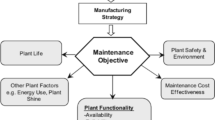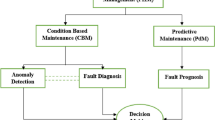Abstract
As machine learning (ML) techniques and sensor technology continue to gain importance, the data-driven perspective has become a relevant approach for improving the quality of maintenance for machines and processes in industrial environments. Our study provides an analytical literature review of existing industrial maintenance strategies showing first that, among all extant approaches to maintenance, each varying in terms of efficiency and complexity, predictive maintenance best fits the needs of a highly competitive industry setup. Predictive maintenance is an approach that allows maintenance actions to be based on changes in the monitored parameters of the assets by using a variety of techniques to study both live and historical information to learn prognostic data and make accurate predictions. Moreover, we argue that, in any industrial setup, the quality of maintenance improves when the applied data-driven techniques and methods (i) have economic justifications and (ii) take into consideration the conformity with the industry standards. Next, we consider ML to be a prediction methodology, and we show that multimodal ML methods enhance industrial maintenance with a critical component of intelligence: prediction. Based on the surveyed literature, we introduce taxonomies that cover relevant predictive models and their corresponding data-driven maintenance techniques. Moreover, we investigate the potential of multimodality for maintenance optimization, particularly the model-agnostic data fusion methods. We show the progress made in the literature toward the formalization of multimodal data fusion for industrial maintenance.
This work was partly supported by a grant from the German Federal Ministry for Economic Affairs and Energy (BMWi) for the Platona-M project under the grant number 01MT19005D.
Access this chapter
Tax calculation will be finalised at checkout
Purchases are for personal use only
Similar content being viewed by others
References
Susto, G.A., Mcloone, S., Pampuri, S., Benghi, A., Schirru, A.: Machine learning for predictive maintenance: a multiple classifier approach. IEEE Trans. Ind. Informat. 11(3), 812–820 (2015). https://doi.org/10.1109/TII.2014.2349359
Liu, Z., Norbert, M., Nezih, M.: The role of Data Fusion in predictive maintenance using Digital Twin. AIP Conf. Proc. 1949(1), 020023 (2018). https://doi.org/10.1063/1.5031520
Manco, G., et al.: Fault detection and explanation through big data analysis on sensor streams. Expert Syst. Appl. 87, 141–156 (2018). https://doi.org/10.1016/j.eswa.2017.05.079
Niu, G., Li, H.: IETM centered intelligent maintenance system integrating fuzzy semantic inference and data fusion. Microelectron. Reliab. 75, 197–204 (2017). https://doi.org/10.1016/j.microrel.2017.03.015
Guo, L., Li, N., Jia, F., Lei, Y., Lin, J.: A recurrent neural network-based health indicator for remaining useful life prediction of bearings. Neurocomputing 240, 98–109 (2017). https://doi.org/10.1016/j.neucom.2017.02.045
Acorsi, R., Manzini, R., Pascarella, P., Patella, M., Sassi, S.: Data Mining and Machine Learning for Condition-based Maintenance. In: (eds.) Proceedings of the 2017 International Conference on Flexible Automation and Intelligent Manufacturing FAIM, 27–30 June 2017, Modena, Italy, pp. 1153-1161 (2017). https://doi.org/10.1016/j.promfg.2017.07.239
Safizadeh, M., Latifi, S.: Using multisensory data fusion for vibration fault diagnosis of rolling element bearings by accelerometer and load cell. Inf. Fusion 18(1), 1–8 (2014). https://doi.org/10.1016/j.inffus.2013.10.002
Schmidt, B., Sandberg, U., Wang, U.: Next generation condition based Predictive Maintenance. Methods 13306, 4–11 (2014)
Schenk, M.: Instandhaltung technischer Systeme. Springer, Heidelberg (2009). https://doi.org/10.1007/978-3-642-03949-2
Otto, B., et al.: Industrial Data Space – Digital soveregnity over data, In: Fraunhofer Gesellschaft zur Förderung der angewandten Forschung (2016)
Diez-Olivan, A., del Ser, J., Galar, D., Sierra, B.: Data fusion and machine learning for industrial prognosis: Trends and perspectives towards Industry 40. Information Fusion 50, 92–111 (2019). https://doi.org/10.1016/j.inffus.2018.10.005
DIN EN-13306. DIN Standards – Maintenance terminology, Beuth Publishing DIN (2018). https://dx.doi.org/10.31030/2641990
DIN EN-31051. DIN Standards – Fundamentals of maintenance, Beuth Publishing DIN (2019). https://dx.doi.org/10.31030/3048531
Baltrusaitis, T., Ahuja, C., Morency, L.: Multimodal Machine Learning: A Survey and Taxonomy. IEEE Trans. Pattern Anal. Mach. Intell. 41(2), 423–443 (2019). https://doi.org/10.1109/TPAMI.2018.2798607
Alpaydin, E.: Classifying multimodal data. In: Oviatt, S., Schuller, B., Cohen, P.R., Sonntag, D., Potamianos, G., Krüger, A. (eds.) The Handbook of Multimodal-Multisensor Interfaces, In Association for Computing Machinery and Morgan & Claypool, NY, pp. 49–69 (2018)
Noman, N.A., Nasr, E.S.A., AlShayea, A., Kaid, H.: Overview of predictive condition based maintenance research using bibliometric indicators. J. K. Saud Univ. Eng. Sci. 31(4), 355–367 (2019)
Oates, B.J.: Researching Information Systems and Computing. Sage Publications Ltd., Thousand Oaks (2006)
Peffers, K., Tuunanen, T., Rothenberger, M., Chatterjee, S.: A design science research methodology for information systems research. J. Manag. Inf. Syst. 24(3), 45–77 (2007). https://doi.org/10.2753/MIS0742-1222240302
Bunks, C., McCarthy, D., Al-Ani, T.: Condition-based Maintenance of machines using hidden Markov Models. Mech. Syst. Sign. Process. 14(4), 597–612 (2000). https://doi.org/10.1006/mssp.2000.1309
Deuszkiewick, P., Radkowski, S.: On-line condition monitoring of a power transmission unit of a rail vehicle. Mech. Syst. Sign. Process. 17(6), 1321–1334 (2003). https://doi.org/10.1006/mssp.2002.1578
Hao, Y., Sun, J., Yang, G., Bai, J.: The application of support vector machines to gas turbines performance diagnosis. Chinese J. Aeronaut. 18(1), 15–19 (2005). https://doi.org/10.1016/S1000-9361(11)60276-8
Baraldi, P., Zio, E., di Maio, F.: Unsupervised clustering for fault diagnostics in nuclear power plants components. Int. J. Comp. Intell. Syst. 6(4), 764–777 (2014). https://doi.org/10.1080/18756891.2013.804145
Merkt, O.: On the Use of Predictive Models for Improving the Quality of Industrial Maintenance: an Analytical Literature Review of Maintenance Strategies. In: Ganzha, M., Maciaszek, L., Paprzycki, M. (eds.) Proceedings of the 2019 Federated Conference on Computer Science and Information Systems FedCSIS, 1–4 September, pp. 693-704. Leipzig University, Leipzig, Germany (2019). https://dx.doi.org/10.15439/2019F101
Alexandru, A.: Using Expert Systems for Fault Detection and Diagnosis. Industrial Applications (1998)
Krishnakumari, A., Elayaperumal, A., Saravanan, M., Arvindan, C.: Fault diagnostics of spur gear using decision tree and fuzzy classifier. Int. J. Adv. Manuf. Technol. 89(9–12), 3487–3494 (2017). https://doi.org/10.1007/s00170-016-9307-8
Jaramillo, V.H., Ottewill, J.R., Dudek, R., Lepiarczyk, D., Pawlik, P.: Condition monitoring of distributed systems using two-stage Bayesian inference data fusion. Mech. Syst. Sign. Process. 87, 91–110 (2017). https://doi.org/10.1016/j.ymssp.2016.10.004
Liu, C., Li, Y., Zhou, G., Shen, W.: A sensor fusion and support vector machine-based approach for recognition of complex machining conditions. J. Intell. Manuf. 29(8), 1739–1752 (2018). https://doi.org/10.1007/s10845-016-1209-y
Diez, A., Khoa, N.L.D., Alamdari, M.M., Wang, Y., Chen, F., Runcie, P.: A clustering approach for structural health monitoring on bridges. J. Civil Struct. Health Monit. 6(3), 429–445 (2016)
Li, C., Sánchez, R.-V., Zurita, G., Cerrada, M., Cabrera, D.: Fault diagnosis for rotating machinery using vibration measurement deep statistical feature learning. Sensors 16(6), 895, 1–19 (2016)
Widmer, T., Klein, A., Wachter, P., Meyl, S.: Predicting Material Requirements in the Automotive Industry Using Data Mining. In: Abramowicz, W., Corchuelo, R. (eds.) BIS 2019. LNBIP, vol. 354, pp. 147–161. Springer, Cham (2019). https://doi.org/10.1007/978-3-030-20482-2_13
Mosallam, A., Medjaher, K., Zerhouni, N.: Data-driven prognostic method based on Bayesian approaches for direct remaining useful life prediction. J. Intell. Manuf. 27(5), 1037–1048 (2016). https://doi.org/10.1007/s10845-014-0933-4
Alsina, E.F., Chica, M., Trawinski, K., Regattieri, A.: On the use of Machine Learning methods to predict component reliability from data-driven industrial case studies. Int. J. Adv. Manuf. Technol. 94(5–8), 2419–2433 (2018). https://doi.org/10.1007/s00170-017-1039-x
Cristaldi, L., Leone, G., Ottoboni, R., Subbiah, S., Turrin, S.: A comparative study on data-driven prognostic approaches using fleet knowledge. In: Arpaia, A., Catelani, M., Cristaldi, L. (eds.) Proceedings of the 2016 IEEE International Conference on Instrumentation and Measurement Technology (I2MTC), 23–26 May, 2016, Taipei, Taiwan, pp. 1-6 (2016). https://doi.org/10.1109/I2MTC.2016.7520371
Liu, Q. (C.), Wang, H.P. (B.): A case study on multisensory data fusion for imbalanced diagnosis of rotating machinery. AI EDAM 15(3), 203–2010 (2001)
Xenakis, A., Karageorgos, A., Lallas, E., Chis, A.E., Gonzalez-Velez, H.: Towards distributed IoT/cloud based fault detection and maintenance in industrial automation. In: Shakshuki, M.E., Yasar, A.-U.-H. (eds.) Proceedings of the 10th International Conference on Ambient Systems, Networks and Technologies (ANT 2019), April 29 - May 2, 2019, Leuven, Belgium, pp. 683–690 (2019). https://doi.org/10.1016/j.procs.2019.04.091
Sobaszek, Ł., Gola, A., Kozłowski, E.: Application of survival function in robust scheduling of production jobs. In: Ganzha, M., Maciaszek, L., Paprzycki, M. (eds.) Proceedings of the 2017 Federated Conference on Computer Science and Information systems FedCSIS, 3–6 September 2017, pp. 575-578. Czech Technical University in Prague, Prague (2017). http://dx.doi.org/10.15439/2017F276
Sobaszek, Ł., Gola, A., Kozłowski, E.: Job-shop scheduling with machine breakdown prediction under completion time constraint. In: Ganzha, M., Maciaszek, L., Paprzycki, M. (eds.) Proceedings of the 2018 Federated Conference on Computer Science and Information Systems FedCSIS, 9–12 September 2018, pp. 437-440. Adam Mickiewicz university Poznan, Poland (2018). http://dx.doi.org/10.15439/2018F83
Khaleghi, B., Karray, F., Khamis, A., Razavi, S.N.: Multisensor data fusion: a review of the state-of-the-art. Inf. Fusion 14, 28–44 (2013). https://doi.org/10.1016/j.inffus.2011.08.001
Bengio, Y., Courville, A., Vincent, P.: Representation learning: a review and new perspectives, Technical report. Univ. Montreal, 35(8), 1798–1828 (2013). https://doi.org/10.1109/TPAMI.2013.50
Baban, C.F., Baban, M., Suteu, M.D.: Using a fuzzy logic approach for the predictive maintenance of textile machines. J. Intell. Fuzzy Syst. 30(2), 999–1006 (2016). https://doi.org/10.3233/IFS-151822
Cui, W., Lu, Z., Li, C., Han, X.: A proactive approach to solve integrated production scheduling and maintenance planning problem in flow shops. Comput. Ind. Eng. 115, 342–353 (2018). https://doi.org/10.1016/j.cie.2017.11.020
Seidgar, H., Zandieh, M., Mahdavi, I.: An efficient metaheuristic algorithm for scheduling a two-stage assembly flow shop problem with preventive maintenance activities and reliability approach. Int. J. Ind. Syst. Eng. 26(1), 16–41 (2017). https://doi.org/10.1504/IJISE.2017.083180
Chou, C.-A., Jin, X., Müller, A., Ostadabbas, S.: MMDF 2018 Multimodal Data Fusion Workshop Report. Northeastern University, Boston (2018)
Author information
Authors and Affiliations
Corresponding author
Editor information
Editors and Affiliations
Rights and permissions
Copyright information
© 2020 Springer Nature Switzerland AG
About this paper
Cite this paper
Merkt, O. (2020). Predictive Models for Maintenance Optimization: An Analytical Literature Survey of Industrial Maintenance Strategies. In: Ziemba, E. (eds) Information Technology for Management: Current Research and Future Directions. AITM ISM 2019 2019. Lecture Notes in Business Information Processing, vol 380. Springer, Cham. https://doi.org/10.1007/978-3-030-43353-6_8
Download citation
DOI: https://doi.org/10.1007/978-3-030-43353-6_8
Published:
Publisher Name: Springer, Cham
Print ISBN: 978-3-030-43352-9
Online ISBN: 978-3-030-43353-6
eBook Packages: Computer ScienceComputer Science (R0)




